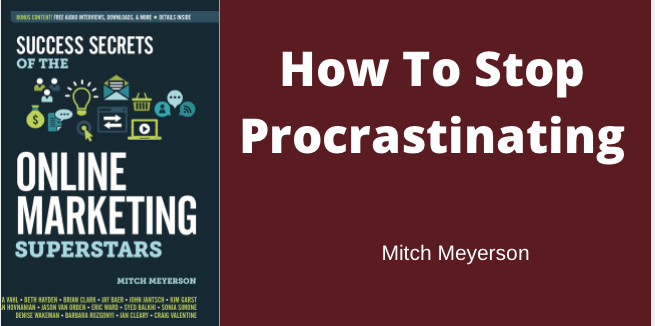Feeling frustrated and guilty because you are not following up on your most important goals? This article will dig into the underlying causes and steps you can take to break though.
So Why Do People Procrastinate?
There are a number of reasons people procrastinate, and a person who procrastinates may do so for more than one reason. Here are a few of the most common reasons. Score yourself 1-10 on each.
- Task Complexity —the task seems daunting, and one doesn’t know where to begin.
- Under-developed organizational skills —the skills required to plan and orchestrate the sequence of activities needed are absent.
- Resentment about complying with the wishes of others —if it’s not one’s own idea or if the task is not a result of willing participation.
- Perfectionism —holding unreasonably high standards, and being fearful they might not be met.
- Time Crunch —the task will require the commitment of large blocks of time, and these are not easy to arrange.
- Fear of failure, or fear of success —either way, fear gets in the way of getting started, and often.
- Task Saturation —there are simply too many things on the agenda to do, so it’s hard to get started on any one of them.
- Diversions and Distractions —focus and attention are difficult to sustain because the environment is not controlled.
The Stories We Tell Ourselves
It’s easy to convince one’s self that procrastination is justified or that it’s not really a problem. Stories which might be created to mask the underlying procrastination include things like:
- “I always do better when I’m down to the wire”
- “There’s always tomorrow”
- “I’m not ready yet”
- “Life is meant to be enjoyed”
- “They are really unfair to put those demands on me”
- “It’s just too hard”
- “I’ve got to wait until I can do it perfectly—when I have the right energy level”
- “Things aren’t that bad”
- “If I don’t think about it, maybe it will go away”
Your Fieldwork for Today: Taking Control
Procrastination, like most behavior, is learned and is reinforced by our environment. The good news is that it can be unlearned, and unlearning it is also reinforced by our environment as well as by the good feeling we get from having accomplished something.
- Stop telling yourself stories and identify the real reason for your procrastination. This can help you get you out of denial and into action.
- Recruit an accountability partner. Ask someone you know and trust to be your partner in success. Have the person help you establish reasonable time frames and parcel the work into manageable chunks and keep you to your commitments to yourself.
- Identify what YOU want to accomplish and why you want to accomplish it instead of focusing on the “shoulds” and agendas imposed by others.
- Prioritize what needs to be done —when you have a clear road map of what needs to be done first, and get organized around that, the total task doesn’t seem so daunting.
- Eliminate distractions and diversions — eliminate these from your work environment so you can focus.
- Play to your strengths — it’s hard to do anything that requires one to play to one’s weaknesses. Figure out how you can bring your strengths to the task, and you’ll be amazed at how much you’ll be able to accomplish. Manage your weaknesses by delegating those task components to someone else, re-negotiating so that they are removed altogether, or installing a support system (daily reminders, affirmations, etc.), which will help you complete those task components.
- Don’t make the task larger than life — look at what the task is really asking of you in terms of time commitment, knowledge and skill. A more realistic appraisal of the task requirements can often take the edge off of it and help you get started.
- Recognize that taking on something may mean giving up something else — over-commitment is the nemesis of real accomplishment. Unload your agenda so you can focus on the really important things, and enjoy the rest of your life![/list]
Mitch Meyerson has been a life coach and psychotherapist for over 30 years as well as an expert on Oprah. If you want to get to the bottom line of your personal roadblocks quickly and set up a laser focused consultation click on this link-> email
